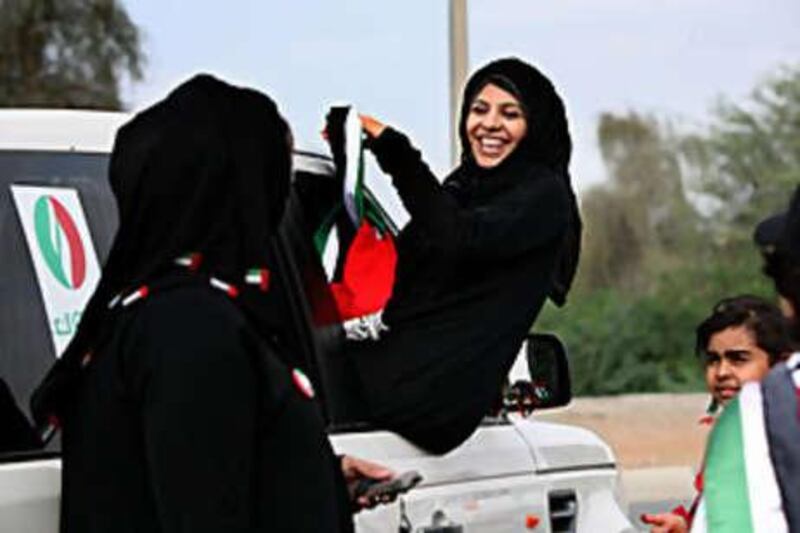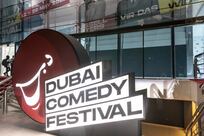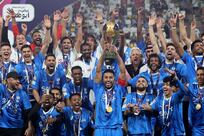It was entirely appropriate that Khadija Faramarzi was talking to us from the Dubai Autodrome. It was here that the 25-year-old Emirati made her debut as a motor racing marshal in 2003. "I always loved cars and motor sports and becoming a marshal was a good way to get close to the fast cars," she said with a shy smile that belies her love of all things automotive. She is among a group of women from the Women's Auto Racing Club (WARC) who took part in a UAE National Day drive from Fujairah to Abu Dhabi that took in all seven emirates en route. This was the second year in a row that WARC organised a drive, dubbed the Unity Drive, for National Day. "Last year, it was seven cars, one for each emirate, and it was to encourage special needs kids to get involved with motor sports," said Zubaida Al Bloushi, a 27-year-old Emirati who works in Bahrain as a systems consultant.
Before the drive, we were told that we had to stick to a pretty tight time schedule with stops of half an hour to 45 minutes. True to their word, the drive set off from an Enoc garage precisely on time, and it was the start of a very efficient, well-run day. Even on the road, patriotic glamour was a priority in the group. Nine cars hit the road for the very start of the drive at 8am from Fujairah, and the early hour did not deter these women from making stylish and event-appropriate statements. For National Day, Al Bloushi had a special abaya and hijab tailor-made for the day - the abaya and the edge of her hijab were intricately embroidered in spirals of the Emirati colours of red, white and green on the black fabric. The rest of the Emirati women who started the drive in Fujairha were similarly decked out in UAE colours - Faramarzi's hijab is a floaty Emirati flag and Tahani Al Beidh, an off-road enthusiast, added red beads to her outfit. But even more heavily adorned than the drivers were the cars themselves. Every National Day, it is not uncommon to see cars proudly parading the streets of every emirate festooned with flags, decals and stickers, and these women had gone to enormous trouble to decorate their cars. My Honda Pilot, although a lovely metallic mocha colour, seemed a little underdressed compared with the cars in the convoy, which featured everything from satin flags to heart-shaped stickers to feather boas. It was quite the spectacle as we snaked our way out of Fujairah and, despite the relatively early hour, the horns were already blaring to herald our presence. The drive was not just about celebrating 37 years of the United Arab Emirates but it was also part of an awareness campaign for the early detection of breast cancer. In the Arab world, up to 80 per cent of women with breast cancer are diagnosed only at an advanced stage and is much harder to cure. In most western countries, only around 20 per cent of women are not diagnosed until the cancer is in the late stages, and breast cancer can almost always be treated if it is picked up early. A big part of this disparity is a lack of education about early detection as well as social taboos surrounding breast cancer among Arabs.
The horns continued to play their merry tune and, as we arrived in Ras Al Khaimah, plenty of other drivers, invariably in similarly colourful cars, tried to join the convoy. Safety was a big priority and the police escort provided firm but friendly guidance to prevent chancers from barging into our meticulously formed cavalcade. I got to test out the depth of the Pilot's petrol tank - a leisurely breakfast at the hotel in Fujairah meant that I missed the first fuel stop, so we hit the road with enough fuel to get us about 74 kilometres. There was a cold sweat as we stopped at two diesel-only garages before finally fuelling up 10km shy of Ras Al Khaimah, having run on near-empty for about 20 clicks. But we weren't the only ones who had to make a desperate run to a garage. Temporarily disappearing from the convoy as we stopped at Saqr Public Park was Al Beidh and her beloved Toyota FJ Cruiser, a car she fell in love with and ordered from the US before it was even on sale in the UAE. We thought she'd slipped off to get some petrol, or perhaps she'd found a dune she liked the look of. After all, she had said: "I love taking my car out into the desert, there is nothing better, and I love dune biking, too." But it turns out that somewhere between Fujairah and Ras Al Khaimah, Al Beidh's horn stopped working, so she found a friendly garage to fix it up. "There was no way I was going to do the whole drive without my horn," she said. As with every stop, the drivers took the opportunity to re-dress their cars, with Al Sayed in her bronze Nissan Altima and Al Bloushi in a silver Hummer H3 making sure everything was running smoothly. Al Sayed couldn't stop smiling and said: "It's great, everyone is having a great day." The drive through the rather sleepy emirate of Umm Al Quwain was uneventful, but punctuated by the architectural spectacle of Dreamland Aqua Park and the ageing aeroplane that has sat rusting by the beachside for years. Between Ras Al Khaimah and Umm Al Quwain, we spotted what appeared to be an astonishing, half-built man-made mountain, but nobody seemed to know the purpose of this project - it remains another unsolved mystery that left us eagerly awaiting a breathless press release from a developer. Shaima Al Sayed, an outspoken 32-year-old Emirati who also took part in the drive, works in healthcare and has experienced first-hand the issues involved with educating women in the UAE about breast self-examination and regular mammograms. "When I show women a training video or even models, they blush and giggle," she said. "Some women are scared to examine themselves, but I tell them they'd rather self-examine than have someone else do it."
The original plan was to be in Ajman for a 12.30pm lunch. Thanks to the super-efficiency of the organisers and the excellent police escort that gave us right of way at every roundabout and the temporary right to run red lights, we pulled into a beachside car park at precisely 12.08pm. A gaggle of men enjoying the day off on the beach look bemused as the group that now comprised 16 cars turned out to be all women, save for a couple of young boys. In between bites of croissants and samosas, everyone signed a board with their thumbprints and wrote messages wishing the UAE a happy 37th birthday. Some messages were in English, some in Arabic, but all conveyed a genuine joy at celebrating National Day. A concerned looking Al Sayed rushed over to us to make sure we had our coupons for free breast screenings. "Go! Go! Get your coupons!" she urged us. "This is important." It was a great reminder of the purpose of the drive to raise awareness for early detection of breast cancer. It's not every day that you see people eagerly signing up for a medical examination, but everyone was enthusiastically making sure they didn't miss out on their coupon. Along with the coupons, everyone was taking pink plastic hanging signs that looked similar to "do not disturb" signs in hotels, but these outlined the steps involved in breast self-examination. Al Sayed and Al Bloushi, both keen to break the taboos surrounding breast cancer, were delighted with the lack of embarrassment as the signs and brochures were snapped up.
The commuters who make the Sharjah-Dubai drive on a daily basis would have been very jealous indeed of the police escort. Every working day, countless drivers spend an infuriating length of time covering the relatively short distance between the two emirates. But the convoy of women, now up to 20 cars, was able to cut a swathe through the traffic and drive to Dubai quickly, but still with time to appreciate Sharjah's sparkling water views. In the opposite direction, there was a bumper-to-bumper traffic jam that seemed to defy the laws of logic, as it was a public holiday and it was more likely those drivers were taking in the view of the next car's exhaust pipe rather than the pretty corniche. By the time we reached Dubai, Al Beidh was dismayed to discover her horn was playing up again, but her enthusiasm for her beloved FJ Cruiser remained intact even if they have grown in popularity since she imported hers from the States. "When I first got it, everyone stopped to ask me 'What car is this?'. I even held off from getting the windows tinted because I wanted everyone to see me in it - but now the FJ is everywhere." It was a brief stop at another Enoc garage, but there was still time for the face paints to make an appearance and grown women were eagerly daubing their cheeks with UAE flags. On each stop along the way, brochures on self-examination and early detection were handed out to women. "Pink Army" badges, symbols of the fight against breast cancer, were sold for Dh5. Every participant in the drive received a coupon for a free breast examination at Medcare Hospital. While breast cancer is seen as an older woman's disease in many countries, it is striking women at a much younger age in the UAE, with women aged around 35 commonly being diagnosed at the younger end of the age spectrum. "There is a taboo about breast cancer here and there should be screening in the UAE from the age of 35 - many women here get diagnosed much younger than in other countries. And it's not just Emirati women, it's women of all nationalities," said Al Sayed. "This is something I am passionate about - 44 per cent of women diagnosed with breast cancer die of it in the UAE because early detection just isn't here."
The drivers pulled at the Family Park in Abu Dhabi at around 5.30pm, bang on schedule. After congratulating each other on the seven-emirate epic, the group continued on to the Marina Mall, where some the women opted to hang out after a long day in the car, while others summoned the energy to find a spot to watch Abu Dhabi's spectacular National Day fireworks. Any stereotypes about female drivers pootling along at a snail's pace were dispelled by the brisk pace of the day, something for which Al Sayed is very grateful. "A lot of Emirati men still think women can't drive and it is because of women who drive like this," she said, imitating the technique of tightly clutching of a steering wheel that seems to be favoured by the elderly all over the world. The Emirati women involved in the drive were all passionate about cars and driving, and all had their own reasons for loving to get behind the wheel. Al Beidh attributes her love of cars to growing up in a male-dominated household. "I'm the only girl, I have all brothers, I'm the eldest with five brothers - men have seen me racing up the dunes and they have taken videos of it on their camera phones because they couldn't believe it." Al Sayed says her family has stopped her from driving powerful cars because she likes going fast. "I've always liked boys' things - I love football and fast cars." She may have driven a Nissan Altima on the drive, but she was very curious about the Honda Pilot as it is on her list of potential cars to buy. I was able to reassure her that it is a very comfortable ride and, while it has the potential to incite speed cameras to flash, her family can probably rest assured that she won't get up to too much black point-inducing mischief in one. Regardless of what car Al Sayed ends up purchasing, she can be confident that the breast cancer screening message is slowly but surely catching on among women for whom publicly discussing the subject was once considered unthinkable, and the Unity Drive certainly played a part in that mission. Al Bloushi, also a member of a women's go-karting club in Bahrain, has very personal reasons for wanting the Unity Drive to raise awareness of breast cancer screening. The quick-witted go-karting enthusiast has a very personal reason for getting involved in the Unity Drive. "My aunt passed away last year because of breast cancer," she said in quieter tones. glewis@thenational.ae






